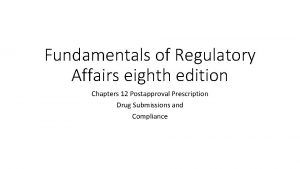MCUL Key Regulatory Issues MCULs Regulatory Affairs strategy



- Slides: 3

MCUL – Key Regulatory Issues MCUL’s Regulatory Affairs strategy and focus revolve around the central themes of advocacy, information, and implementation. - From an advocacy standpoint, the year has been dominated by new proposed and final by a number of federal agencies (30 comment calls and 24 comment letters in 2013). rules promulgated - From an information standpoint, MCUL continues to focus on: Info. Sight; CUBE TV; high quality publications; educational efforts in partnership with DIFS, NCUA, and MCUL Education; and close-tosource access to key regulatory information sources. - From an implementation standpoint, MCUL Regulatory Affairs works closely with CUSG Compliance Consultants and CUSG Credit Union System Relations on support for individual credit unions; the Compliance Helpline service; maintenance of Info. Sight and Policy Pro; assisting with development of Comply. Site as needed; and direct interaction with credit unions for assistance and education. A full listing and description of the comment calls and letters that MCUL issued in 2013 on regulatory proposals from NCUA, CFPB, FASB, FHFA, and FFIEC. A full listing and description can be found at: http: //www. mcul. org/files/cucorp/744/file/Reg%20 Affairs/Reg%20 Summary%20 Chart/2013%20 Chart/Summary%20 Chart %20 -%20 December%203, %202013. pdf

MCUL – Key Regulatory Issues Risk-Based Capital: The NCUA’s current Risk-Based Capital proposal would be the most detrimental and broadreaching regulatory change to impact credit unions in years. It is projected the proposal would require credit unions to maintain an additional $7. 3 billion in capital. The proposal would layer on top of the statutory leverage ratio requirements a risk based standard that would require credit unions to hold capital at 8% of risk-based assets in order to be considered adequately capitalized, and 10. 5% to be considered well-capitalized. This is in addition to the 6% and 7% leverage ratio requirements to be adequately and well-capitalized under the current regulation. The NCUA indicates the proposal was issued to provide parity for credit unions with the capital requirements of corporate credit unions and community banks. However, the risk ratings associated with the proposal are dramatically different than those under Basel III for community banks. CUSO investments, residential mortgage loans and small business loans would carry a risk rate from 100% to 250%. Additionally, the proposed rule if implemented in its current form, would allow for subjectivity by a regulator to require additional risk-based capital above what is proposed in the regulation, even if a credit union meets well-capitalized status. The NCUA has also proposed an implementation period of only 18 months. Comments are due back to the NCUA by May 28, 2014.

MCUL – Key Regulatory Issues Availability of Funds and Collection of Checks (Reg CC): The Federal Reserve Board (Fed) is proposing revisions to Regulation CC which implements the Expedited Funds Availability Act and the Check 21 Act. The Fed is proposing two alternative approaches to modify the current expeditious-return and notice of nonpayment requirements to encourage financial institutions to transition to electronic returns, as opposed to paper. There also revisions related to electronic checks and returns, electronically-crated items that are not derived from paper checks and remote deposit capture (RDC). Joint Agency – Minimum Requirements for Appraisal Management Companies: The joint agencies (Office of the Comptroller of the Currency, Treasury (OCC); Board of Governors of the Federal Reserve System (Board); Federal Deposit Insurance Corporation (FDIC); National Credit Union Administration (NCUA); Bureau of Consumer Financial Protection (Bureau); and Federal Housing Finance Agency (FHFA) (collectively the “Agencies”) are proposing a rule to implement the minimum requirements of the Dodd-Frank Act to be applied to States in the registration and supervision of appraisal management companies (AMCs). The proposed rule would 1) Establish the minimum requirements for the registration of AMCs; 2) establish the minimum requirements for AMCs that register with the State; 3) require federally regulated AMCs to meet the minimum requirements; and 4) require the reporting of certain AMC information to the Appraisal Subcommittee.





